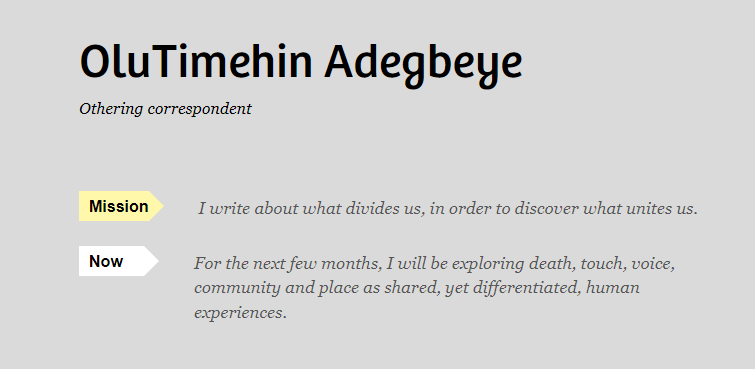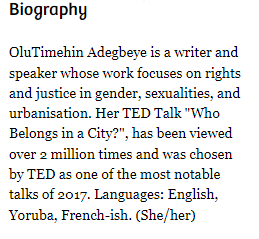Too many people rely on misguided tactics to provide people a sense of inclusion in group settings.1
Nouns and pronouns are of minimal use to understand someone. With knowledge about someone’s race, sex, gender, or age, you can guess at what they believe, think, or feel. By guessing their personality and belief system, however, you’re not engaging in perspective taking. You are merely relying on stereotypes - treating a person as an indistinguishable member of a monolithic group.
Adjectives, on the other hand, offer insight into the dynamic qualities of an individual.
The Humanity of Adjectives
Consider the personal information of journalists writing for the news outlet, Correspondents. OluTimehin Adegbeye can be defined by visible demographics on her website. Yet, this information is dwarfed by prior accomplishments, current projects, and a sense of purpose that underlies these actions.
Ever hear of an “othering correspondent?” Me either. Utterly fascinating. I want to meet her. I want to know what she did previously that led to this career. I love the specificity of her mission - “in contrasting the workings of privilege vs disenfranchisement, scarcity vs surplus, safety vs violence, I hope to enlighten readers about the systems that rule our lives so that we can get better at resisting and dismantling them.” Read her writings, listen to her speak because of the high potential for enlightenment, not because of race-matching, pronouns, or other demographics.
Two Competing Psychological Needs
When aiming for a culture of inclusion in schools or the workplace, understand the target. Dr. Bernardo Ferdman offers this definition of inclusion:
In its most general sense, inclusion involves both being fully ourselves and allowing others to be fully themselves in the context of engaging in common pursuits. It means collaborating in a way in which all parties can be fully engaged and subsumed, and yet, paradoxically, at the same time believe that they have not compromised, hidden, or given up any part of themselves. Thus, for individuals, experiencing inclusion in a group or organization involves being fully part of the whole while retaining a sense of authenticity and uniqueness
You can feel two psychological needs competing for attention: fitting in and standing out. Far more effort is spent helping people fit in with nary an allowance for someone to deviate from what the group bonds over.
Lead introductions with adjectives.
Meet my hyper intelligent friend who is bound to find a new angle to whatever it is you happen to be thinking about, especially morality and economics.
That’s what you want to hear when meeting someone for lunch.
You mentioned a job opening? Get ready because this person to my left is a conscientious, compassionate, curious, and courageous motherfucker!
That’s what you want to hear when looking to fill a position.
And if you happen to meet someone from a place of adjectives (strengths, passions, and actions) be sure to volley with some curious questions. Something to the effect of, “That’s quite an opening, please, tell me more. I’d love to hear a story about why these descriptions capture you.”
Do not limit yourself or anyone else to what is immutable.
Do open the portal of what makes you exceptional.
Provocation
Only a small number of characters fit in an email signature or name tag. What’s the best way to use this real estate and show what makes you unique and exceptional? Perhaps it’s a psychological strength such as raconteur, maximizer, or incubator. Perhaps it’s a passion such as deep sea diving or climbing Mount Fuji. Perhaps it’s an interest such as still recovering from A Little Life by Hanya Yangihara. Offer tantalizing adjectives that initiate exuberant conversations.
If you enjoyed this issue, please leave a ❤️. For more psychological insights & tools, read The Art of Insubordination: How to Dissent and Defy Effectively. Send thoughts & questions. I love hearing from readers.
According to optimal distinctiveness theory, humans in social groups try to deal with the tension of competing goals to feel a sense of belonging (who fit in) and feel as if they are distinctive members (who stand out). I discuss strategies for satisfying these needs in depth as part of Chapter 5 - Attract People Who’ve Got Your Back: How to Off-load Some of the Pressure While Defying the Status Quo.






